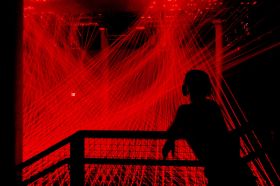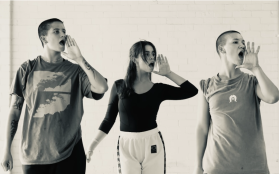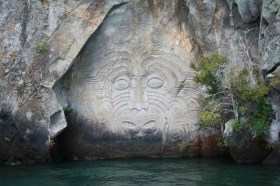It is my privilege and pleasure to stand on the lands of the Gadigal and Wangal peoples on the shores of Tumbalong. Every day I marvel at the extraordinarily beautiful waterways and landscapes of the Eora nations. It is truly a beautiful country in all its deep emerald water and sandstone glory.
I pay my respects to your elders past and present and to First Nations playwrights in the room. You are awesome and I love your self-determination and collective power.
Now, before I begin. A trigger warning. Now don’t moan… This is a safe space after all.
We never used to have trigger warnings back in the day, but us older theatre folk, we’re slowly getting used to these spoiler alert trigger warnings that tell everyone what’s going to happen in the show.
But, in all seriousness now…
For any children and young people in the audience, there will be a few ‘F’ and ‘C’ bombs in this keynote address, so parents and carers please get ready to block ears or take your little ones out to a hopefully child and family friendly space in the vicinity.
Another trigger warning – to all of the editors and dramaturgs out there with your red pens at the ready. There will be bad grammar. I don’t do proppa English. I’m gonna tell you like it is.
When I imagined myself at this podium, I dreamed of a politician-like scenario. I imagined my Elders and Blackfella colleagues standing behind me – a Blackfella flag on the right and a TI flag to the left – with my people nodding earnestly in agreement or quietly holding their fists in the air – your First Nations power buoying my sails and giving me the courage to talk strong.
Safety in numbers, see?
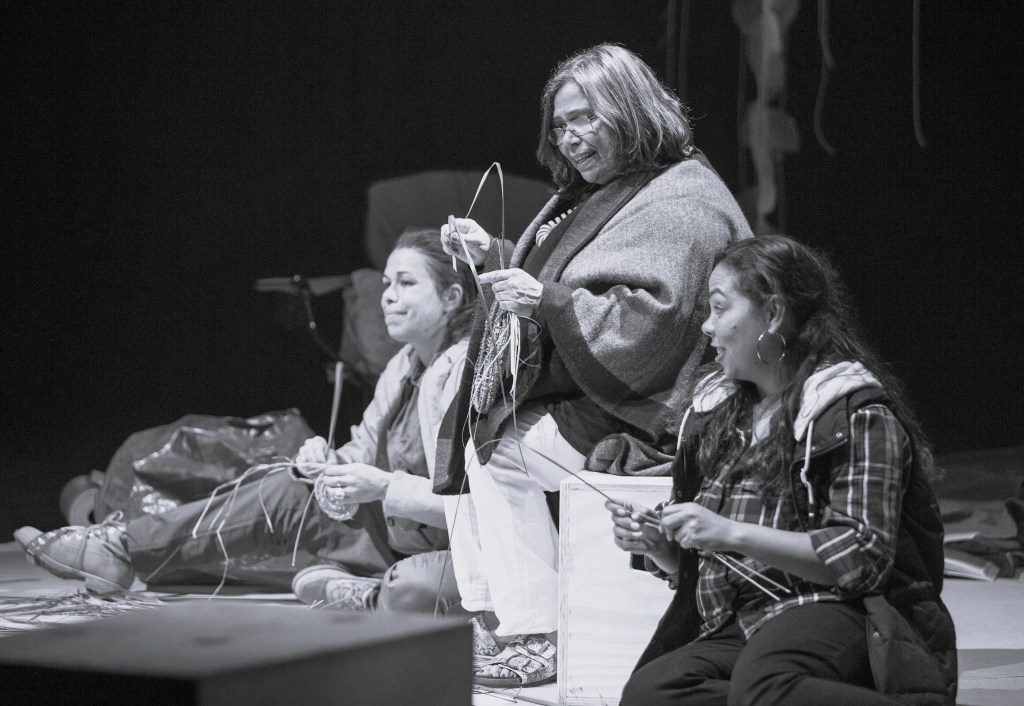
My totem is the long-neck turtle and I really did need quite a bit of coaxing to get up and talk to you today. Poor Deborah [Franco, from Currency Press]chased me for months as I ducked and wove around the question. And then Papa Wesley [Enoch] called me and well … then I couldn’t refuse.
Safety in numbers, see?
Like my totem, I often stick my neck out in this industry, write, stage, direct a play (either my own or somebody else’s) and then I need to retreat. Go back into my shell. Take stock. Every new theatrical adventure requires a stupid amount of courage. We dive into the unknown, we follow our hunches, we burn with things we have to say. We stand naked on stage and let the rotten tomatoes hit us, or we puff ourselves up with others’ praise. We stand in foyers before and after our shows and tremble. We pore over the reviews and exclaim ‘they just don’t get it’ or ‘they love it!’. Or ‘that’s interesting, I didn’t think that was the kinda play I wrote’. And we take our colleagues’ or family’s silence or confusion as an insult. We’re just not that good at talking to each other about theatre.
So here I am.
Safe Spaces. Risky Ideas.
It seems trite to talk about risk in theatre, when in this country – for some of us – simply being a boy walking home from school with your mates can be life-threatening. Or to throw an imaginary spear or to run around a stadium with an Aboriginal flag draped proudly around your shoulders will have you hung, drawn and quartered.
I wish I could say to you that Australia is a safe place to live and work, but from my Blak eyes – that is sadly not the case.
When touring Sunshine Super Girl around the country last year, I can’t tell you how many times I had to stand awkwardly in VIP theatre donor events waiting for the question from an overly manicured and bejewelled woman who would inevitably ask ‘are all your cast Aboriginal?’
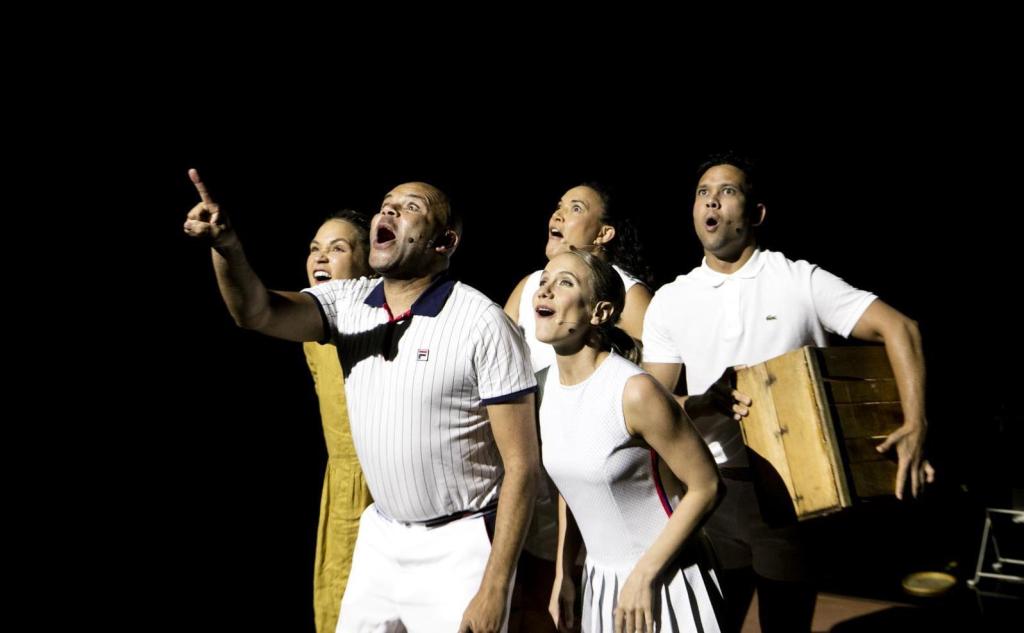
Or when Senator Alex Antic, after being invited to the opening night of our Blak-affirming show, wrote an open letter to the Board of the STCSA (State Theatre Company South Australia). Rather than praise the achievements of our first Aboriginal women’s world champion, Evonne Goolagong-Cawley (performed by an all Blak and brilliant cast), Senator Antic asked why the Board hadn’t commissioned a play about Margaret Court. ‘Look over here!’ he cried as he baited his constituency.
You can say the most racist things on mainstream television in this country and still be awarded a Gold Logie.
Horrifyingly, Western Australian legislation to protect Aboriginal heritage sites like Juukan Gorge on Puutu Kunti Kurrama and Pinikura lands was reversed after a backlash from farmers, who became the public face of Australian racism; while the mining industry cowered and egged them on from the sidelines. What an insult! What a cowardly backflip! To take with one hand and give with the other.
Do I feel safe in this country? No.
Is it any wonder that us blackfellas have grown tired of telling you what we want? For relying on government legislation for protection and advancement. Our trust in you, our patience, is fast running out.
And I know there are others in this country who feel unsafe too.
Dare speak up about sexual assault in the workplace in this country and you’ll be sued by your abuser who’s been cashed up by a bunch of grubby white male cheerleaders.
Look what happened to Green Door Theatre when they privileged reviewers of colour at the Melbourne opening of their season of 7 Methods of Killing Kylie Jenner and asked the usual reviewers to buy their own ticket. Oh, the kerfuffle!
The conservative commentators and white male cartoonists with their pens at the ready – to lampoon and belittle Black self-determination – ‘how dare you take my privileged place!’ they cried.
Climate change is impacting the world on a horrifying scale. Fires, floods and pandemics loom. Waterways, weather and migration patterns that my people have relied upon for centuries are being destroyed.
We are not going to be able to air-condition our way out of this crisis – something’s got to give.
When we demand a safe space, when we seek to draw the terms in which our work will be viewed, when we express ourselves culturally in all of its glory, when we seek to protect our sacred sites and children – we are told time and time again to get back in the box. Are we really that scary?
I do not take lightly the great honour it is to tell my people’s stories and to have them staged. It is a privilege and responsibility not to be wasted.
We wear the scars of colonisation on our chests like so many welts. It’s painful, humbling, maturing. We flounder without initiation, we connect and disconnect. We walk on country with our bare feet and touch the trees to feel heartbeats deep. We hunt. We forage.
But as I stand before you with my imaginary tribe behind me, I have never felt so unable to speak my truth to both Blak and White Australians. Which is ironic really, given that right now our Voice is so hotly up for debate. If ever we needed evidence of how easily we can be divided and conquered, it is now. I worry for you, My Country. Those colonial foundations of yours are so deeply flawed, so poisonous. I want to shout from the tallest trees and speak my truth, I have sought counsel from my Elders, but they too are divided.

I can’t stand in one camp or the other for fear of insulting my brethren and sistas, my Aunties and Uncles. To say either “yes” or “no”’ seems like the craziest act right now. It’s exhausting, divisive, deeply worrying and sometimes encouraging.
Safety in numbers. But now we are being divided. Once again.
Amid all of this drama, can us playwrights heal and unite this country with our little plays? Is that our job or are we just here to entertain? To distract? To give philanthropists a guilt-free option to blak or green wash their ill-gotten gains? To make subscribers happy?
Or are we here to serve our communities? To empower and embolden and question and poke – in an effort to foster understanding and hopefully make Australia a better and safer place for all?
Safety and risk may seem like polar opposites. Too much safety and you risk complacency and parochialism; too much risk and it’s dangerous, repulsive. Are us playwrights prepared to toe this fine line?
We all know those plays that want to shock? The playwright that trawls for the most controversial material to make a name for themselves. Who gets off on their own words and forgets the true power of theatre.
Risky work with nothing to say is not risky, it’s just annoying…
To shock an audience is cheap.
I want theatre that makes me squirm. I want to be profoundly moved – shattered even. I want your stories to worm their way into my psyche so that I will never forget. I want your plays to wake me up. I take it personally when I see shit theatre. That thing I’ve invested a lifetime in. It shits me when I see hollow reworkings of classics, “great ideas” devoid of heart, bad imitations – that’s not risky, that’s a knock-off.
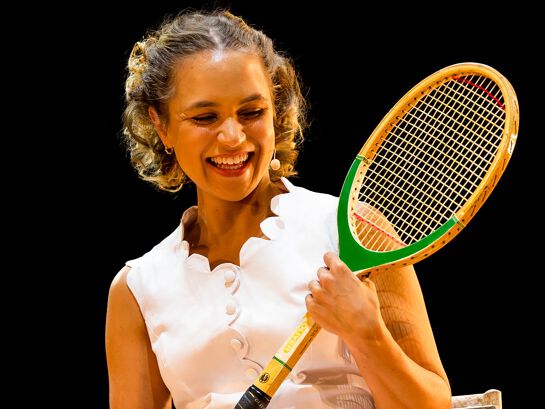
Have us playwrights become too safe in our form? Is that what our theatre companies want from us? Why have we stopped experimenting? Why are we favouring conventional and predictable play structures? What of cultural fusion?
I am excited by plays that are playing with form and I think of the times that theatre has broken me in two:
When the dancers at the end of Bangarra’s seminal Ochres looked on as a collective at what lay on the horizon.
When Ningali Lawford (Biami rest her soul) declared ‘you are nothing without your language’ in her one-woman triumphant play that made me cry like a baby and declaring from that day forward to speak and write in my father’s Yorta Yorta tongue.
When the dripping of that ice block in Deb Mailman and Wesley Enoch’s Seven Stages of Grieving shed a thousand tears on our behalf.
When Dorothy Hewett uttered the infamous last words of her play The Tatty Hollow Story and stated boldly, ‘My cunt stinks’.
When Nathan Maynard burnt his protagonist to death on a fiery pyre and every cell of my being wanted to yell, ‘No! that’s not the answer you shit stirrer!’
When the women’s boobs in Jenny Kemp’s Call of the Wild flapped and percussed on their bodies as their feet trod in unison on the soil-laden stage of Richmond’s Church Theatre.
When the actors in Nicholas Brown’s Sex Magick moaned in the dark and foggy confines of Griffin Theatre and gave power to long held tantric and Kathakali traditions in an Indian-queer critique of his mob’s sexual conservatism.
Now that’s risky theatre.
And then I think of the times I’ve felt safest in our theatres.
Like when I’m in an audience and there’s a big mob of blackfellas in the crowd. That’s when Blak work on stage truly sings. It shines and vibrates in a sacred way, but alas is only ever afforded to us on previews or community nights.
At the Yellamundie Festival of playwrights surrounded by Blak playwrights and actors, supporting each other’s work wholeheartedly, not pitted against each other in separate enclaves.
At the First Nations Writers Retreats by Australian Plays Transform that provide us with an absolute Blak space to live and work in for 10 days; where our whitefella allies are invited in and respectfully leave each day, so that we can talk freely among ourselves about our art and the challenges we find ourselves working in – or just to have a big yarn.
Safety in numbers, see?
I make the riskiest work when I’m in safe space. But, safe theatre space can also have frisson. In fact it must! The most risky works come when you butt up against each other. When you have to fight for your ideas because you know they feel right. Dreams and hunches are powerful, they are not to be ignored. When you push through trepidation and you band together with a creative team and dare to express – to go against the grain.
But to make risky work, we’ve got to have the right space. I want spaces where we can be robust and messy! I want to have smoking ceremonies in theatre venues without you worrying about your velvet curtains smelling like eucalyptus. I want to not worry about scorching your polished wooden floors. I don’t want to freeze because your building has no passive solar principles. I want to see the outside. I want child and family friendly spaces for my colleagues. I want to be able to put Blu-Tack on the fucking walls without some venue person telling me off!
I swear to god, you fellas! You can overturn legislation that protects Aboriginal sacred sites, but I can’t put Blu-Tack on your fucking walls! Give me a break!
Seriously now.
No doubt, there have been many advances on Australian stages.
First Nations work is now considered a mainstay in most theatre programs in Australia big and small. And I thank those who paved the way – Uncle Jack Charles, Auntie Justine Saunders, Uncle Bill Onus, Uncle Bob Maza – to name a few.
There are more women directors and playwrights than ever before. (Remember ladies, when only 20% of plays were written or directed by women, and how we had to shame white male artistic directors to give us space?)
Most recently we’ve seen the formation of Safe Theatres Australia thanks to the courageous women who worked bravely and intelligently to demand a united industry front against bullying and harassment in all forms, that woke theatre companies up to their responsibility to provide safe spaces and rigorous procedures for professional theatre workers.
We demand to be safe in our studios and the proliferation of intimacy and consent coaches is a welcoming development.
I give praise to artistic directors who are giving power to diverse artists and our stories – to women, to queer artists, to blackfellas and more people of colour.
Most lately this has been achieved in no small part by pioneering artists and producers, like Annette Shun Wah who formed Contemporary Asian Australian Performance (CAAP) and has Tiger Mummed her way onto mainstages for Asian playwrights – the fruits of her labour plain for all to see and now championed by the equally brilliant Tessa Leong who now helms CAAP.
But despite these advances, there’s also a feeling of panic among our predominately white artistic directors… After the powerful arguments of the Me Too and Black Lives Matter movements, there’s a feeling of scrambling. A series of hasty creative and casting decisions that lack rigour. A fear of social media shaming that is skewering artistic programming and pushing our work out prematurely and/or incorrectly.
What good are our diverse faces and stories in your theatre programs and on your stages when the fundamental foundations and physical theatre spaces are still based on colonial power structures, when our most valued commodities as First Nations People – reciprocity and respect – are not understood?
It’s confusing for Blackfellas when we bring our works to artistic directors, or are contacted out of the blue and there’s been no exchange or conversation. When they take our stories and our faces for their programs, but offer nothing in return and don’t understand our cultural responsibilities, or tell us our cultural protocol requirements are too expensive. Reciprocity and Respect are two of our most highly valued commodities – but it takes two to tango.
Read: The “helping” hand of allyship: Indigenous art, authenticity and politics
What good are our voices if we aren’t listened to or respected? And it’s not just about the vibrational, vocal, expressive act of speaking, it’s also about listening. Relating. Doing. It’s an active exchange… Reciprocity and respect.
And us blackfellas don’t always communicate with our voices either… Sometimes we can’t look you in the eye and we’re not always clear about what we want to say… especially if we’re singled out or don’t feel safe, or it’s culturally inappropriate. Sometimes you have to read between the lines. It’s called subtext and us playwrights know a thing or two about subtext.
Don’t ask us questions or give us your stages and expect us to communicate or express ourselves in your way or under your terms. Sometimes we need more time and can’t always fit into your panicked schedules and financial constraints. We think and do things differently and have different responsibilities to people and culture, and that’s OK.
Back in my day it was all about ‘We Have Survived.’ Not anymore!
On the days I work at Griffin Theatre, I walk from Kings Cross Station and look up at the building-sized artwork of Yuwi, TI and South Sea Islander artist Dylan Mooney. Towering above me in all its high-rise glory are two young queer Blak men, ochre emblazoned across their faces, holding each other closely.
Overlaid on that image are the words
‘STILL THRIVING’
It puts a spring in my step and warms my Blak heart…
Every. Single. Time.
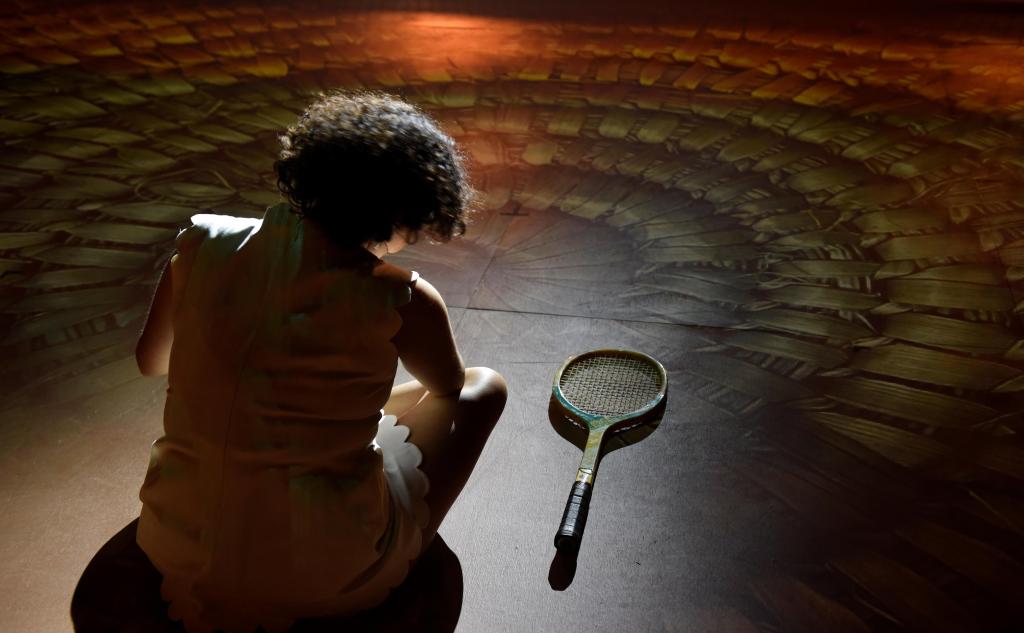
I am in awe of our young ones. I bask in their glow. These fierce and strong hipsters, wearing their Indigenous fashion, neon colours and jewellery like a nulla nulla. They don’t want to be called “playwrights” or “he” or “she”; they’re exploding boundaries like never before and they’re certainly not in this room. They don’t take any bullshit. They ask the hard questions. They see your structures and don’t want to work in them. They’re forming their own businesses, collectives and organisations. Theatre and arts companies are seriously going to have to change before these young upstarts step onto your stages an,d if they do, they want to do it on their own terms.
I wish I had half the bravery and audacity that these young Blak artists have today.
Artists like those at Green Door Theatre are asking you to look at the structures we work within, not just your biased programming. We make safe Blak space wherever we can. We have to. It is the basic condition within which our work thrives.
This is when Blak voices truly take flight.
Right now, this country is being served up a referendum shit sandwich. The question is a simple one really:
‘A Proposed Law: to alter the Constitution to recognise the First Peoples of Australia by establishing an Aboriginal and Torres Strait Islander Voice. Do you approve this proposed alteration?’
It’s a question that’s come to us from the heart of Aboriginal Australia, but there are a lot of heads muddying the waters.
In answer to the question there are three options as I see it.
1. Vote Yes – if you want to support the proposition put to Australia from decades of discussion around the country from a large group of Aboriginal people who came together with a common aim to improve their people’s lives. Polling has indicated that up to 80% of Blackfellas around the country support the Voice.
2. Vote No. And there are two Nos
A racist “No” if you want to align yourself to Liberal conservatives, media barons and big business interests hell bent on gaining political points to get back into power – all the while ignoring the fact that the idea of a Voice was Liberal=backed in the first place. Fuelled by a slew of misinformation and scaremongering via social media – everyday Australians are being deliberately confused and frightened.
But I ask you, how can the most disadvantaged people, through no fault of our own, be such a threat to 97% of the population?
They say the taxpayers’ money will be wasted – crying about a cost of living crisis, while not batting a lid at eye- watering corporate profits. Us blackfellas know a thing or two about tax. The destruction of our homelands by mining and farming has been extremely taxing. Culturally and spiritually. We’ve paid our taxes one hundred fold and, I don’t know about you, but I’d rather have my taxes going to the Voice rather than a nuclear submarine, but there you have it.
Then there’s a Progressive “No” if you want to align yourself to left wing radicals who are calling for a treaty first, who advocate for sovereignty and community-driven approaches, who point to the numerous failures of successive governments to deliver the recommendations of the Deaths in Custody and Bringing them Home Reports and have a complete lack of faith in the political system. Who rightly point out that the constitution is racist anyway.
The third option is to not vote at all – opting out of the whitefella system altogether and maintaining sovereignty of clan and country as always. Easy to say if you’ve got land rights… but not all of us do.
Like I said – it’s a shit sandwich. And while middle Australia takes itself down the “No” poo-shoot – progressive or racist – these conservative forces capitalise on our animal need for “safety” by fearmongering and misinformation that continues to divide us.
I urge you to have conversations with each other. We’re playwrights! We like to yarn, we’re also damn good researchers! There’s heaps of resources on the internet. Talk to blackfellas. Not just one or two, but a few of us. But, don’t expect us to have the answers, or to bear the responsibility for your constitution. Talk to each other. It’s up to you to decide and I urge you to do that in an informed way.
Read: First Nations Artists on the Voice
I for one, will be voting “YES”. There, I said it. And – like I do on every other occasion I vote – I will be thinking of my forebears, Shadrach Thomas James, William Cooper, Margaret Tucker, John Patten among others who fought so valiantly for citizenship rights, for justice and equal access to education, work, decision-making, for the simple right to vote – all those things that most Australians take for granted.
I don’t see this Voice as a one-stop shop, nor will it be a miraculous panacea. It will be one step – towards rightful recognition and genuine community influence – on the paths of the many steps along the way. Nor will it precede other sovereign movements that are and will happen no matter what.
The stakes are high – and us playwrights know all about stakes. The very planet we live and work on is under threat and it is First Nations modalities that can lead us back to sanity.
If ever we need an Indigenous Voice, it is now.
Regardless of whether you say “yes” or “no” or “in between” what I do know is this:
Nothing will erase the deep and abiding First Nations boundaries, languages, songs, dances, stories and peoples of this country. Spirit is strong.
And no matter what the outcome, my pen will be hovering over the page, like it always does. Ready to write wrongs, to question, to provoke, to stir and unite us in those dark theatre spaces, sharing each other’s breath, holding breath, gasping, tut-tutting, our hearts and minds coming together as one.
So, playwrights and producers and artistic directors of Australia, what will your pen do?
Are you BRAVE enough to give blackfellas space? To recognise us in your dodgy constitution?
Are you BRAVE enough to carry the load? To listen to our VOICES?
Now that’s a risk worth taking.


